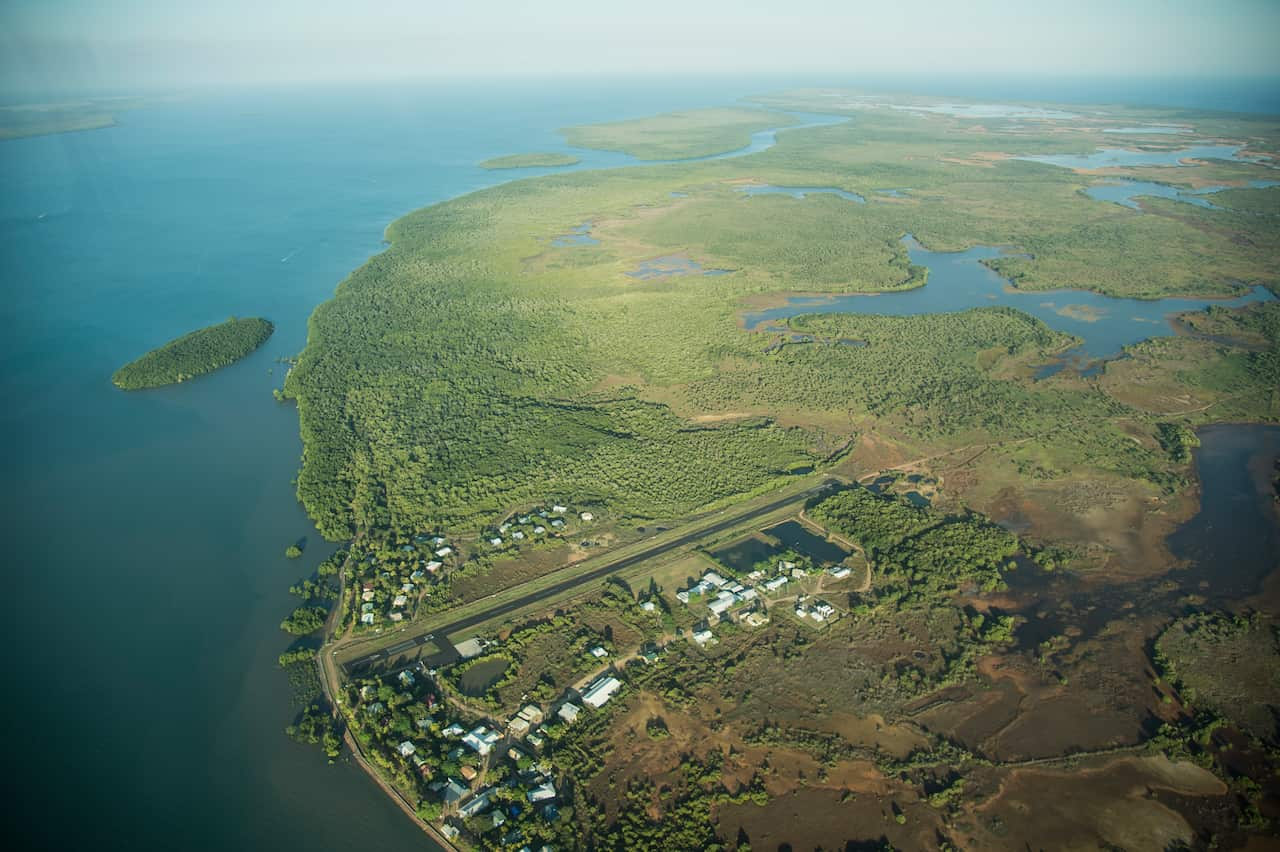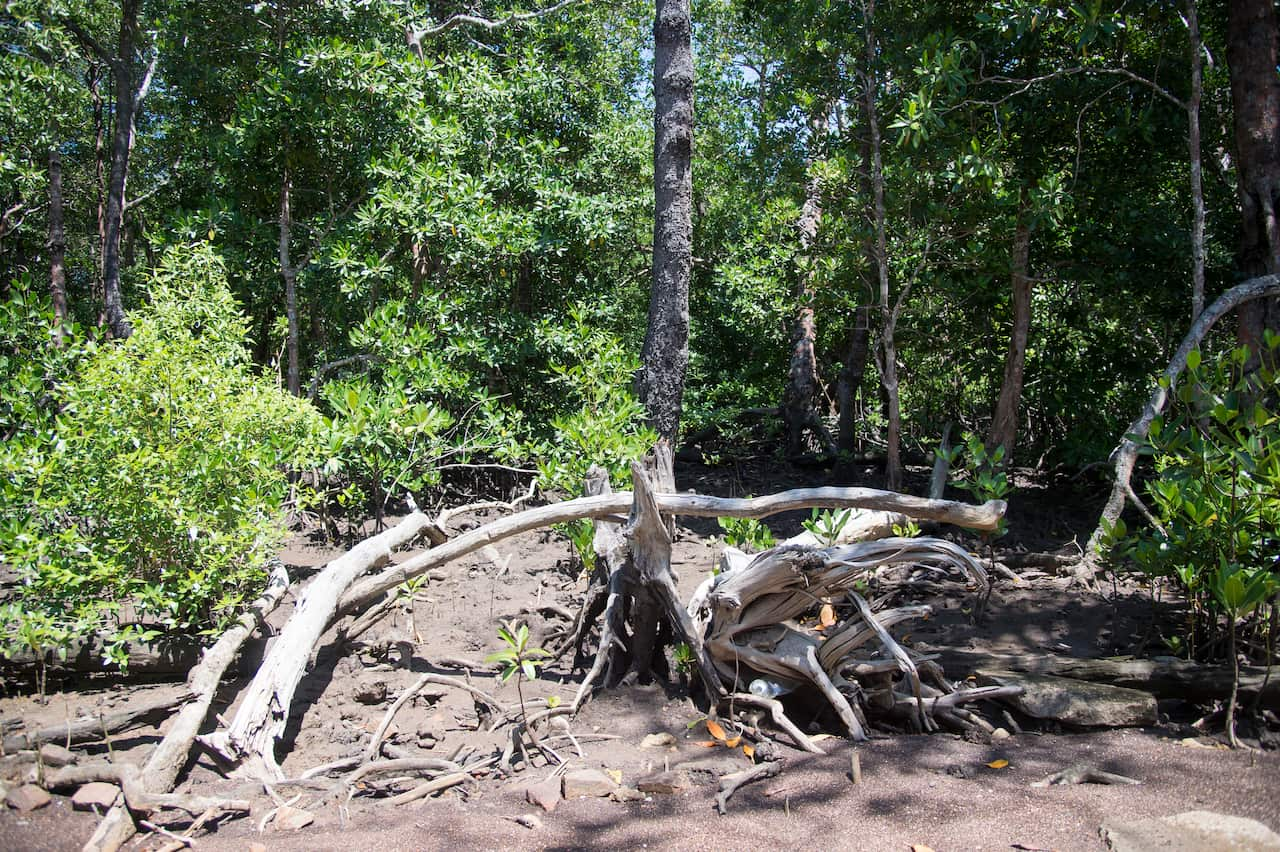“Flying over the Torres Strait Islands, it was clear to see that they are now more water than land,” said Aunty McRose Elu, a Sabai Elder and climate campaigner.
Pointing to the effects of climate change, Aunty McRose said the monsoon season - which would normally be completed by this time of year - was still in force and causing significant flooding on some of the islands.
The situation is critical in the Torres Strait and there are fears it may only take between five to 10 years for some islands in the area to be inundated.
As a result, there are also fears that people living on these islands could become Australia’s first “climate change refugees”.

Saibai Island community from the air, in the Torres Strait, north Queensland, Wednesday, November 2, 2022. Credit: AAP
Her efforts were recognised in 2021 when she received the Queensland Senior Australian of the Year Award.
"I put the Torres Strait onto the global picture in 2015 [at the United Nations Climate Change Conference] in Paris. Nobody knew about the Torres Strait Islands so that was very good - there were a lot of questions asked from the forum," Aunty McRose told NITV Radio.
"I strongly expressed the needs of our people in the Torres Strait, especially on the low-lying islands.
"Yet governments, companies and agencies are slow to act on the issue and climate change and its effects are becoming an increasing problem."
She said seven of the 17 inhabited islands are inundated, including her own.
“The [Australian] government has spent so much money on building up the sea walls but I would say very sincerely that those sea walls are not very effective at all."
She said her own family had to leave their home on the low-lying island of Saibai in the 1940s.
Even then, the effects of climate change were being felt on the island, she explained, and the situation is not getting any better.
"The winds in the Torres Strait are very treacherous and the weather patterns can change in a minute when the sea rises and the storms come and the waves toss on the shores of the islands and the waves go over the sea walls," she said.
She pointed to a recent storm, where the rain became so heavy that the water level became knee-high, posing a threat to people travelling in their cars.
Talking to the people, they have seen the changes with the high tides and the currents. The garden beds are so damaged, we can no longer plant anything.Aunty McRose Elu
This means the islanders depend on imported goods, as Aunty McRose explained.
"People are dependent on supermarkets for their food whereas before the land and the sea were so fruitful."

Climate change-induced sea level rise is slowly causing some trees to die as saltwater inundates parts of the island more regularly on Saibai Island, in the Torres Strait, north Queensland Credit: AAP
Taking action
As a result, the Elders of the islands are taking the federal government to court for “failing to prevent climate change”.
They are demanding “emissions reduction in line with the science”, as they have published on a detailing the case.
And they are receiving support.
The to stand alongside Uncle Paul Kabai on Saibai Island and Uncle Pabai Pabai on Boigu Island as they bring forth the landmark case.
The Elders released a statement, urging governments including the Australian government to take action.
We stand together in asking Australia and those responsible for perpetuating the climate crisis, including the fossil fuel industry, to hear our voices and act immediately to ensure the survival of our homelands, peoples, cultures and way of life.
Aunty McRose said she supports the steps against the government over its alleged inaction on climate change.
She strongly urged Prime Minister Anthony Albanese to visit Sabai and Boigu, the islands most affected by environmental degradation, which were also home to the two Elders leading the court case, Uncle Paul Kabai and Uncle Paibai Paibai.
She hoped that Mr Albanese would witness the effects of climate change on low-lying islands in the Torres Strait for himself.
"Making decisions from Canberra is not good because they need to get up there and see for themselves."
International matter
Can taking the government to court have an impact?
Well, it did in the Netherlands, after the by an environmental organisation on behalf of hundreds of citizens, a
This action played a part in pushing for change, and now the European country is amongst the leaders in tackling climate change.
The Australian government has faced international scrutiny for its stance.
In 2022 the against the impacts of climate change violated their right to practice their culture.
In 2022, Minister for Climate Change and Energy Chris Bowen and said climate change posed a “real and substantial” threat to local communities.
The government announced $15.9 million for a new Torres Strait Climate Centre of Excellence and $83.8 million to develop and deploy First Nations Community Microgrid projects in Aboriginal and Torres Strait Islander communities.
But there are fears that such moves don't go far enough and that the government needs to push for further changes to its climate policy.
The Climate Council believes that the key is to reduce emissions, dramatically.
“Reducing emissions this decade is critical if we are to avoid locking in the most catastrophic impact,” the council said on its .
A new bill passed the parliament in September 2022 outlining Australia's greenhouse gas emissions reduction targets of a 43 per cent reduction from 2005 levels by 2030 and net zero by 2050.
But the Climate Council stated: “For Australia, this [interim target] needs to be a 75 per cent reduction on 2005 levels by 2030. This gives us the best chance of avoiding catastrophic climate consequences."


